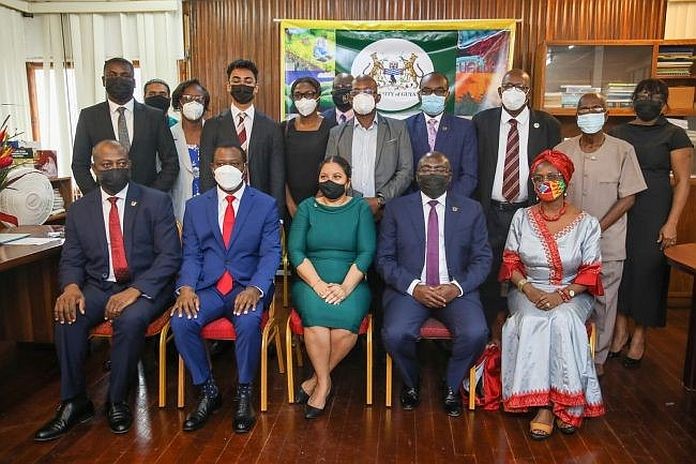By Mikaila Prince
GEORGETOWN, Guyana, (DPI) – To further enhance cooperation between Guyana and Ghana, vice president of the west African nation, Dr Mahamudu Bawumia and vice chancellor of the University of Guyana (UG) Dr Paloma Mohamed-Martin, met on Monday to identify areas where universities of the two countries could collaborate.
Minister of foreign affairs and international cooperation, Hugh Todd, MP, who was also part of the meeting held at UG’s Turkeyen campus, said the shared history of the two countries will foster strong engagements. He said the united ties of Guyana and Ghana are vital to development.
Dr Bawumia said the two countries, with their similar challenges and prospects, have much to share.
“In Guyana, there is a lot of opportunity for us to collaborate on work. We are looking forward to this strategic partnership that’s been built between our two countries. We will look into exchanging ideas; learning from you and you learning from us,” the vice president said.
Among areas open for collaboration are the environment, technology, healthcare, agriculture, infrastructure, and humanities, as well as the oil and gas industry.
On the hydrocarbon industry, Ghana has already begun offering support to Guyana on its Natural Resources Fund (NRF) and local content legislation. Notably, the PPP/C Government is looking to lay the local content Bill in the National Assembly before the end of the year.
“Across the board, we are very looking forward to having some interactions between your and our university. Students building collaboration. We believe that if we get the universities involved then we will bring the countries closer,” Dr Bawumia.
Still on the oil and gas sector, Dean of UG’s School of Entrepreneurship and Business Innovation (SEBI), Professor Leyland Lucas indicated while the center has been collaborating with different institutions to offer programmes, it still needs support in some courses. They include oil and gas taxation, strategic procurement, contract management, and understanding the business environment in the context of an oil-producing nation.
Meanwhile, vice chancellor, Dr Mohammed-Martin related that the institution’s focus is on the future of Guyana; making the country resilient and ensuring that resources multiply.
“In terms of social engineering, Guyana is a perfect place and model for this. We want to change people through education and training, access, inclusion,” she said.
She reminded that faculties at the institution work closely with each government agencies including agriculture, energy, sustainable tourism and infrastructure, as well as national security, among others.
There are 15 national public and ten technical universities in Ghana. The institutions are specific to science and technology, education, business, health and allied sciences and communication, among others.





